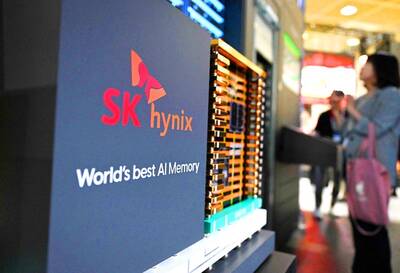Google Inc, owner of the world’s most used Internet-search engine, said Lee Kai-fu (李開復) will step down as president of the company’s operations in China to form a venture in Beijing.
Boon-Lock Yeo, director of the Shanghai engineering office, and John Liu, who heads the sales team in Greater China, will take on Lee’s responsibilities, Mountain View, California-based Google said in an e-mail yesterday. Lee will form a venture capital firm, said Maggie Tsai, a spokeswoman for the departing executive, declining to provide details.
Lee, 47, was at the center of a lawsuit between two of the world’s biggest technology companies four years ago after Google hired Lee from Microsoft Corp in July 2005. His successors will face the challenge of competing in a market dominated by Chinese rival Baidu Inc (百度) and ranked first worldwide in terms of online censorship.
“Lee has faced a lot of pressure from the government, which has really stepped up its censorship efforts, so his departure may be a relief for him personally,” said Isaac Mao, a fellow at Harvard University’s Berkman Center for Internet & Society. “Google has been too compliant to the Chinese government, and modeling Baidu too closely. It should be more independent-minded and less concerned with short-term results.”
In June, Google suspended its “Suggest” search prompt feature on its Chinese site after the local-language service was criticized by the government for providing links to pornographic material. China adopted “punitive measures” against the company’s international site, Foreign Ministry spokesman Qin Gang (秦剛) said on June 25, as the service became inaccessible to Chinese Web users for hours.
Google’s share of China’s paid-search market dropped to 29.1 percent in the second quarter, compared with more than 30 percent in the previous three months, according to Analysys International. Baidu’s market share increased to 62 percent from 59 percent, according to the Beijing-based research firm.
Lee helped start Google’s Chinese-language site and oversaw the rollout of services including Google Maps, Google Music Search and Google Translate, according to the statement.
Microsoft sued Google in 2005 after the Internet-search company hired Lee, saying the executive was a Washington resident when he signed the non-compete agreement and is governed by the law of that state. The companies said in December that year they settled the dispute, without disclosing the terms of the agreement.
Lee was born in Taiwan and raised in Tennessee. He is a former assistant professor of computer science at Carnegie Mellon University in Pittsburgh and worked for Microsoft for five years. Microsoft chairman Bill Gates testified in September 2005 that Lee was “one of the top two” people influencing the company’s strategy in China.

Intel Corp chief executive officer Lip-Bu Tan (陳立武) is expected to meet with Taiwanese suppliers next month in conjunction with the opening of the Computex Taipei trade show, supply chain sources said on Monday. The visit, the first for Tan to Taiwan since assuming his new post last month, would be aimed at enhancing Intel’s ties with suppliers in Taiwan as he attempts to help turn around the struggling US chipmaker, the sources said. Tan is to hold a banquet to celebrate Intel’s 40-year presence in Taiwan before Computex opens on May 20 and invite dozens of Taiwanese suppliers to exchange views

Application-specific integrated circuit designer Faraday Technology Corp (智原) yesterday said that although revenue this quarter would decline 30 percent from last quarter, it retained its full-year forecast of revenue growth of 100 percent. The company attributed the quarterly drop to a slowdown in customers’ production of chips using Faraday’s advanced packaging technology. The company is still confident about its revenue growth this year, given its strong “design-win” — or the projects it won to help customers design their chips, Faraday president Steve Wang (王國雍) told an online earnings conference. “The design-win this year is better than we expected. We believe we will win

Power supply and electronic components maker Delta Electronics Inc (台達電) yesterday said it plans to ship its new 1 megawatt charging systems for electric trucks and buses in the first half of next year at the earliest. The new charging piles, which deliver up to 1 megawatt of charging power, are designed for heavy-duty electric vehicles, and support a maximum current of 1,500 amperes and output of 1,250 volts, Delta said in a news release. “If everything goes smoothly, we could begin shipping those new charging systems as early as in the first half of next year,” a company official said. The new

SK Hynix Inc warned of increased volatility in the second half of this year despite resilient demand for artificial intelligence (AI) memory chips from big tech providers, reflecting the uncertainty surrounding US tariffs. The company reported a better-than-projected 158 percent jump in March-quarter operating income, propelled in part by stockpiling ahead of US President Donald Trump’s tariffs. SK Hynix stuck with a forecast for a doubling in demand for the high-bandwidth memory (HBM) essential to Nvidia Corp’s AI accelerators, which in turn drive giant data centers built by the likes of Microsoft Corp and Amazon.com Inc. That SK Hynix is maintaining its